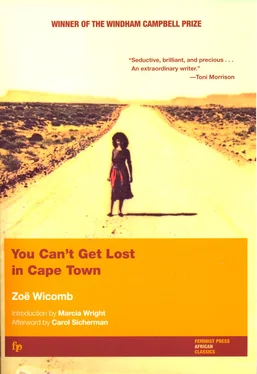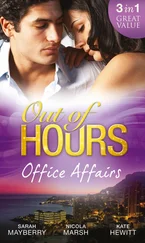The goats that had settled down for the afternoon’s rest stir as I approach the trees. I do not have a hat and sit down in the dappled shade where sparse leaves admit dancing flecks of sunlight. Birds flutter through the needle-leafed branches. A donkey brays from behind a further clump of trees, frogs croak and water, if only there were enough, would surely babble its protest from its separate brooks.
I spit and watch the gob sizzle on the hot sand. It is not only an act of exasperation; my sinuses are troublesome today. And what do I expect? Did I not hope that my senses would quiver with receptivity, that all these sights and sounds would scratch about in the memory like hens in the straw until they found the perfect place to nest. Where in feather-warm familiarity I could be the child once more, young and genderless as I roamed these banks alone, belonging without question to this country, this world.
In the ghanna bushes behind me there is a rustling sound I cannot identify. I remember the words, ‘Beware of snakes,’ the red letters of the warning label escaping from Father’s lips. It is true that he stumbled over the first syllable in the way that people do when they search for something to say. And muffled by the sound of my chair pushed back, I pretended not to hear. Just as I did this morning when he said, ‘It’s no good being so touchy. Just shut yourself off against things around you, against everything, and you’ll keep your self-respect. There’s something for you to try when you come back.’ When he raised his torso from the sawhorse the two suspended flaps of greased hair fell once again into their ordained places, adjacent, without a fraction of overlap, covering the shiny pate completely. If only there were no need to bend. Is it my fault that Father has grown so old?
My hand goes to the crown of my own head. If my hair should drop out in fistfuls, tired of being tugged and stretched and taped, I would not be surprised. Do my fingers run through the synthetic silk with less resistance than usual? What will I do in the damp English weather? I who have risked the bulge of a bathing suit and paddled in the tepid Indian Ocean, aching to melt in the water while my hair begged to keep dry. What will I do when it matts and shrinks in the English fog? Perhaps so far away where the world is reversed an unexpected shower will reveal a brand-new head of hair sprung into its own topiarian shape of one-eared dog.
A whip cracks through the silence. If I keep very still I might not be seen, but the foliage is too sparse. It is Oom Dawid in his ankle-hugging veldskoen and faded khaki shirt, flourishing his whip. My tongue struggles like a stranded fish in the dry cavity of my mouth. Why do I find it so hard to speak to those who claim me as their own? There is nowhere to hide so with studied casualness I walk towards him, but the old man, preoccupied, seems to stumble upon me, squinting before he greets. The stentorian voice has shrunk to a tired rumble and the eyes are milky in their intimate search of my face. The great rough hand shakes mine with faltering vigour and under his smile my mouth grows moist and my tongue pliant once more.
‘Ja,’ Oom Dawid says, ‘about time you came home to see us. But I hear you’re going over the waters to another world. Now don’t stay away too long.’
‘Yes, it’s nice to be back. I’m going to England on New Year’s Day,’ I blurt.
‘Still,’ the old man persists, ‘you’re home now with your own people: it can’t be very nice roaming across the cold water where you don’t belong.’
I burrow the point of my shoe in the sand and giggle foolishly.
‘Ja, Ja-nee. ’ Oom Dawid rumbles. ‘So-o, so it goes,’ which he repeats after a short silence with the ease of someone offering a fresh diversion in the face of flagging conversation. Then his face breaks out in a network of smiles as he remembers a request he has been nursing.
‘About the Queen,’ he announces, ‘you must go and see if she’s still young and beautiful.’
I remember the faded magazine picture of the Coronation stuck above his sideboard.
‘Oh, I won’t be seeing the Queen of England. I don’t care two hoots about her.’ I instantly regret the sharp words. But the old man laughs, unperturbed.
‘Then I’ll have to go and see for myself one day and tell the Queen about these Boers and how they treat us.’
He looks at me sharply. ‘You have to put your heart with someone. Now you don’t want to know about Vorster and you don’t care about the Queen and our Griqua chief isn’t grand enough for you. It’s leaders we need. You young people with the learning must come and lead us.’
The old guilt rises and wrings the moisture from my tongue. Even though I know him to be committed to the slogan of Grown-ups Know Best, that he wouldn’t dream of paying heed to anything I have to say.
‘Ja. aa. so-o,’ Oom Dawid reiterates and the old Namaqua eyes narrow amiably. ‘Anyway, you’re back with us now, here where you can always see the white stones of our mother’s grave on the koppie. And he points to the hills in the distance. ‘And your father grows grey. A man mustn’t grow old without his children around him. Old Shenton must write a letter for me to Lizzie’s madam in Cape Town. She’s got a grand job in Town, a kind of housekeeper for English people, but she must come home now. We’re getting too old. Antie Saartjie can’t do much now — the legs you know. Ag, you young people are so grand in your motor cars,’ he says inexplicably, and turns, deftly pinching his nostrils in turn to propel from each a neat arc of snot.
‘I must go and find these damn mules. Do you remember Bleskop? Very old now, but still goes wandering off to plague me. Yes, I’m after them every day. Like you they’ve always got somewhere to go. More trouble than they’re worth.’
He shakes my hand and walks off, saying, ‘When you get back, come and tell me about the wonderful things across the water. I must tell you about the old days, of how the people trekked from Griqualand’, and he stops for a moment, genuinely perplexed, to add, ‘I don’t know if the Queen knows about all that.’
I watch him stride across the water to the left bank where the new path winds tortuously around the donga. The crack of his whip echoes across the river bed. If I did not fear his scorn, I would have asked him where the gorra was. But he would have seen it as city affectation. ‘Don’t be silly,’ he would snort, ‘you’ve carried water all your life like the rest of us.’
Why did Father not ask me to take a bucket, I wonder, as I walk towards the gorra. I stop to tip the sand out of my shoes but the earth sizzles with heat and I can barely keep my balance hopping on each shod foot in turn. I must find it and get out of this heat.
The wide bank with a sprinkling of Jan Twakkie trees is surely the place. But the bank is a uniformly smooth stretch of sand with no trace of the well. I orientate myself by lining up the great dabikwa tree with the cavern on the left bank. Sitting down, I survey the shape of the gully, unfamiliar at this angle. And move to the left, and move again until the blinding light strikes the fissure where the crabs dig snug holes in the dove-blue clay.
With a twig I draw a circle which is unmistakably where the gorra had been, where it now lies buried under a layer of sand and mud from distant mountains. Or else they have removed it and the wet sand, according to kinetic law, has fallen in piece by piece as it shook off the years of restraint moulded by the cement walls. For the well had been just a six-foot cylinder of cement sunk into the sand and then evacuated. Here Oom Klonkies from Rooiberg trailed his forked stick, frowning, and pronounced that the water would be less salty. And he was right. The water was brack but thirst-quenching, unlike the bitter-salt running water of the river that parches the throat.
Читать дальше












